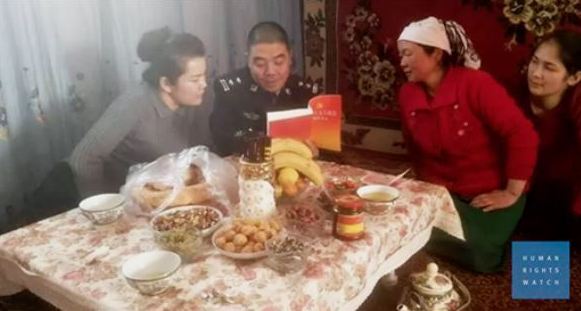
(TibetanReview.net, May15, 2018) – The local Chinese party-government in Xinjiang have implemented since early 2018 a most highly intrusive and perverse campaign called “home stays”, requiring Uyghur Muslim families to host five days every two months party cadres who in return would investigate, indoctrinate and report on them to ensure their absolute loyalty to Beijing, according to a new report by New York-based Human Rights Watch May 13.
“What can be more intrusive than forcing your way into somebody’s home, making them host you while conducting surveillance on them and saying you’re bringing benefits to them?” cnn.com May 14 quoted Maya Wang, senior China researcher at Human Rights Watch and author of the report, as saying.
During these visits, families are required to provide officials with information about their lives and political views, and are subjected to political indoctrination, the group said. Cadres spend at least five days every two months in the families’ homes.
“It’s the ultimate form of surveillance – It’s a forced political indoctrination and assimilation programme, … It’s both creepy and perverse,” Maya Wang has added. “Muslim families across Xinjiang are now literally eating and sleeping under the watchful eye of the state in their own homes.”
The report cited government figures as showing that the “home stay” programme, which evolved from a government attempt that began in 2014 to have officials regularly visit and monitor people in Xinjiang, had greatly expanded since then, involving 110,000 officials just two years ago to more than a million now.
The report cited state media reports as saying these officials – most of whom belong to China’s predominant Han ethnic group sent from government agencies, state-owned enterprises, and public institution – teach minority families to speak Mandarin, sing the Chinese national anthem and organize weekly Chinese national flag-raising ceremonies. These are similar to activities mandated for thousands of Uyghur Muslims arbitrarily detained in political education camps across Xinjiang.
The report noted that in a speech last December, a top Xinjiang official had made clear the scheme’s “strategic importance” in “maintaining social stability and achieving lasting security,” as well as instilling the political theory of President Xi Jinping in the minds of local residents.
A local government statement online was also stated to indicate that officials must inspect the homes they were staying in for any religious elements or logos – and instructed the officials to confiscate any such items found in the house.
The group said cadres meticulously document their activities, including by submitting reports of the homestays with accompanying photos. Some of these photos and videos can be found posted by the cadres on the Wechat and Weibo accounts of the participating agencies, which show scenes of cadres living with minority families, including in the most intimate aspects of domestic life, such as cadres and family members making beds and sleeping together, sharing meals, and feeding and tutoring their children.
The official euphemism for this campaign is “fanghuiju” (an acronym that stands for “Visit the People, Benefit the People, and Get Together the Hearts of the People”) and is stated as being designed to “safeguard social stability.”
The “home stay” initiative and the political education camps were stated to be only parts of a wider campaign which ranged from ubiquitous surveillance cameras to mandatory GPS tracker installation in cars and the collection of DNA of all residents aged 12 to 65.
The report noted that last year authorities also enacted a sweeping anti-extremism law, under which long beards, veils in public and home-schooling were all banned.





